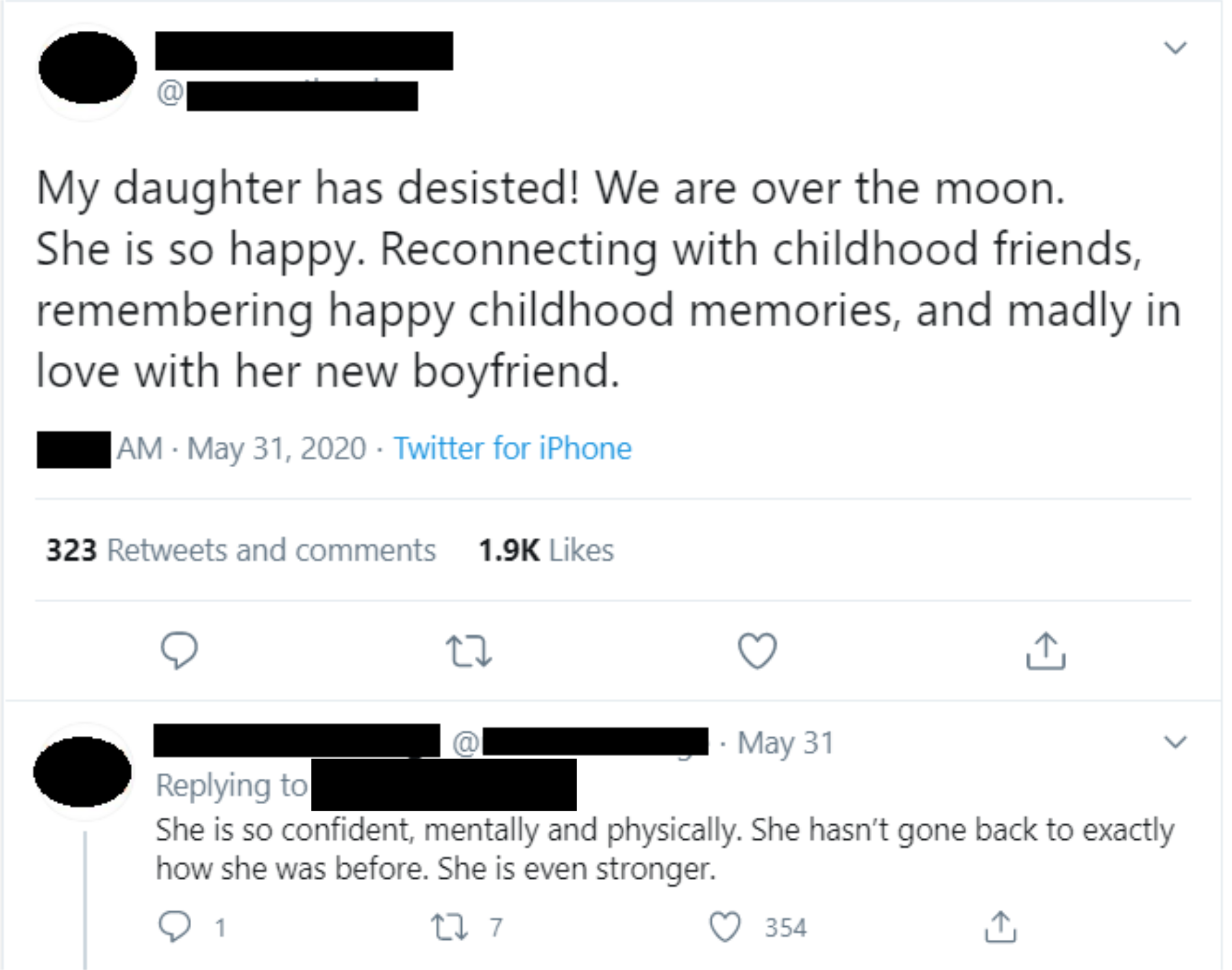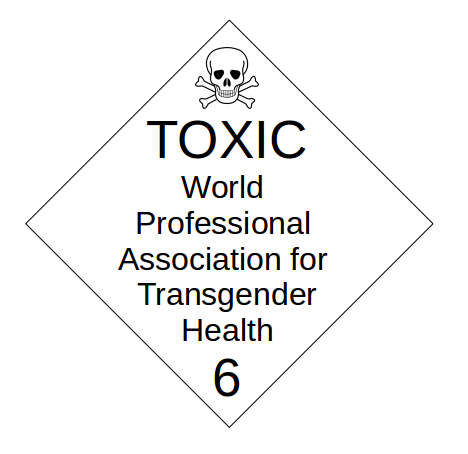Social Media Trends Indicate Rise in Gender Detransition During COVID-19 Lockdown
More research is needed on the causes of detransition

Anecdotal evidence from across social media is indicating that there may be a trend of teens "desisting" gender transition during lockdown. “Desisting” is the act of reverting a gender transition, either socially or medically, to return to presenting as a person’s biological sex.
In a post called “The effect of lockdown on transitioning teen girls”, the user “Thegenderbreadperson”, identifying as a worker in a high school, wrote that the educational institution receives “weekly phone calls” about female-to-male (FtM) transitioned students who are detransitioning since lockdown measures for COVID-19 have taken place in UK.
The user seems to concur with the findings of a research on Rapid Onset of Gender Dysphoria (ROGD), inquiring “perhaps as there is no longer the group peer pressure or affirmation from teachers?” ROGD is a term coined by Lisa Littman, Assistant Professor of the Practice at the Brown University School of Public Health, who wrote an article called “Rapid-Onset Gender Dysphoria in Adolescents and Young Adults: A Study of Parental Reports.”
Littman’s exploratory 2018 study found that teenagers, primarily teenage girls, were “coming out” as transgender in predictable patterns based on sexual orientation, co-morbidity with other mental health disorders, and time spent online and in friend groups were another child had recently identified as transgender.
“Between 2016 and 2017, the number of gender surgeries for natal females in the US quadrupled; in the UK, the rates of gender dysphoria for teenage girls are up 4,400 percent over the previous decade.”
According to Abigail Shrier for the New York Post, in 2016 Littman was browsing social media when she noticed that a whole group of teenage girls in her town, Rhode Island, had started identifying themselves as boys. The phenomenon caught her attention and she began to study it, publishing the results in 2018. Her hypothesis is that trans identification became "peer contagion” among teen girls, troubled by puberty and anxiety issues who were already involved in common health issues, such as anorexia and cutting. According to her research, they could be replacing these self-harm habits for binding (breast-compression) or medical solutions, like hormone therapy and double-mastectomies.
The alarming rise in girls being referred to or seeking gender clinics across the UK and the US also seems to confirm her findings. According to Shrier, author of the book “Irreversible Damage: The Transgender Craze Seducing Our Daughters”, “between 2016 and 2017, the number of gender surgeries for natal females in the US quadrupled; in the UK, the rates of gender dysphoria for teenage girls are up 4,400 percent over the previous decade.”


The Mumsnet user who started the thread also referred to startling numbers about the specific group of girls from the school she works for: there were nine girls in year 9, out of a group of about 160 students, who identified as boys. Of this number, seven have already confirmed that they do not require any further “gender confirmation measures” from the school and are now reidentified as girls. Another one is told to be considering detransitioning as well.
The Mumsnet author concludes her post reflecting how peer pressure and affirmation policies within the school environment seemed to have had a major influence on transidentification. Now that kids and teenagers are under less pressure from affirmation policies such as Transgender Toolkits – which are now being removed for scrutiny and revision in many UK schools for violating several aspects of child safety – the user says: “It really is infectious.”
"In our school there were nine girls out of a approx 160 student year 9 cohort who identified as boys. Seven have now de transitioned since lockdown and one is considering it.”
Some parents on the same thread speculated on the issue down further. User 7Days asks if the removal of other types of peer pressure during lockdown, such as less “sexist/objectifying remarks from boys at school and out and about as well” could have been contributing to the detransitioning wave.
Other parents also wondered about the impact of more of quality time kids and teens might have with their families and carers during the lockdown, not only away from the school environment and the world outside, but also away from social media. There have been many parents over the years warning about YouTube advertisements between children’s videos, or in games apps for mobile phones, Tumblr and other social networks, full of messages encouraging children and teenagers to affirm themselves as the opposite sex if they enjoy behaving, dressing or choices stereotypically associated with the opposite sex they were born in.
Users on the subreddit r/detrans also shared personal stories of detransitioning during lockdown. One user shared:
"I detransitioned over the lockdown period and think that the loss of constant positive affirmation of my transmale identity by friends/strangers definitely contributed to me realising that my transition was more tied to outside influences than I previously realised. When I was around others I was constantly praised and looked up to for being trans - being alone helped me uncover and look into that feeling of ‘wrongness’ that’d started to nag at me since permanent T changes had began."
The Book The Madness of Crowds: Gender, Race and Identity by Douglas Murray (2019) wrote about how "parents do not rejoice in a nine-year-old drag queen being given a modelling contract with an LGBT fashion company and telling other children in a viral YouTube video, 'if you wanna be a drag queen and your parents don't let you, you need new parents'. And they worry when their child's school allows anyone who says they are the opposite gender to be recognized and treated as such. One parent from the north of England recently described how her 16-year-old daughter came out first as a lesbian and then as trans. When her mother and father attended a parent's evening they discovered that the school had already been using their daughter's chosen male name and were using male pronouns to describe her. The school was 'full on affirming.'"
"I detransitioned over the lockdown period and think that the loss of constant positive affirmation of my transmale identity by friends/strangers definitely contributed.”
This post is representative of a pattern. Across social media, parents are reporting lockdown-related trans desistance en masse. Similar posts on other social networks like Twitter and Facebook are also popping up as parents share their experience with children who are either more “accepting” of their birth sex or have desisted of transition during lockdown.

Ideas such as “born in the wrong body” and “gender identity” have become common parlor among students The increase in media around the topic which glamorizes transition may also be a factor. For example, the reality TV show “I am Jazz”, documents the experience of a male teen who recently completed a transition process including surgery for a neovagina. Gender non-conforming girls are also being increasingly erased from mainstream media, part of a trend of trans-ing any young GNC girl on television. Popular dramas such as The Chilling Adventures of Sabrina and Good Girls provide prime examples of this. The result is a lack of gender non-conforming role models for young girls and the increasing acceptance that transition is the only solution.
Shrier also talks about the explosion of the diagnosis of gender dysphoria (severe discomfort in one’s biological sex) in Western societies. She describes the pattern discovered after interviewing over four dozen families with teen girls who identified as boys:
“A girl never expresses any discomfort with her biological sex until puberty, when anxiety and depression descend. The girl struggles to make friends. She immerses in social media and discovers transgender gurus. Or her school holds an assembly celebrating gender journeys, or hosts a Gay-Straight Alliance club pushing gender ideology. At first, she tries out a new name and pronouns. Her school encourages her, keeping all this a secret from her parents. Then, she wants more.”
However, during COVID-19 lockdown, all these influences are less present, thus causing an apparent wave of detransitioning among teenagers. Others, though, have suggested a less optimistic view of the wave of lockdown detransitions, suggesting that children are caving to pressure from unsupportive parents without the support of the school system.
"Her school encourages her, keeping all this a secret from her parents. Then, she wants more.”
Social media has also played an important role in promoting gender transition as fashionable. It's unclear if lockdown has had any impact on social media use among teenagers.
Without more research, it’s hard to know how widespread this experience is or what is causing it.
Shrier talks about the lack of studies on detransioners, even though the “detrans group on Reddit has nearly 13,000 members.” James Caspian, a psychotherapist who attempted to research “reverse gender reassignment,” surgeries and procedures for people who have desisted to transition and want to re-identify with their birth sex, had his proposal rejected by Bath Spa University in 2019. He intended to study the “experiences of people who have detransitioned” at a Master’s level, but the University recused his project claiming it was "too ethically complex for a piece of research at master's level." Littman also faced severe backlash for her study on ROGD. Her study was removed by Brown University’s news section after backlash from trans activists.
The stories shared by parents on Mumsnet and across social media of detransition during COVID-19 lockdown should serve as a starting point for further research into the influence of peer pressure on gender transition and the harm that schools may be doing by participating uncritically in “gender affirmation.”
Do you want to bring the "gender madness" to an end? Help us write about it! 4W is able to pay our all-female staff and writers thanks to the generous support of our paid monthly subscribers.
Enter your email below to sign in or become a 4W member and join the conversation.
(Already did this? Try refreshing the page!)




Comments